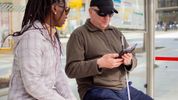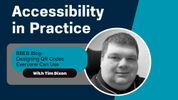With 1 in 5 people having a disability, I find the results of a new study concerning and upsetting.
The new study says millions of Brits don't "act like themselves" around disabled people.
- 77% said they rarely or never interacted with someone who is disabled
- 57% said they were afraid of saying the wrong thing
- 44% reported feeling self-conscious around someone with a disability
- 48% said they wanted to boost their confidence
People with disabilities have the same hopes, dreams and ambitions as those without disabilities. I am not one to dwell on the negative, we have an opportunity to make the world more inclusive and better, this study just highlights how big the opportunity is.
ADVICE FROM FAMILIES SUPPORTED BY FAMILY FUND ON MAKING SOCIAL GET-TOGETHERS MORE INCLUSIVE:
- Don't be afraid to ask families with disabled or seriously ill children over for meet-ups. Think inclusive, wherever possible, so no-one is left out. Playdates can be just as important for parents, to reduce loneliness and isolation.
- Don't worry about asking families questions about a child’s disability or condition, and any adaptations we need – including what foods kids will eat, as diets can be restrictive.
- Talk with your kids about the fact that a disabled or seriously ill child might eat with their hands, need adaptions to eat, or eat different types of food. The greater the awareness in other children, the more it prevents families feeling embarrassed or stared at, at get-togethers.
- Running through what will happen at get-togethers, and what food you’re planning, in advance with families, means they can prepare children, and don’t need to be embarrassed about asking questions whilst there.
- Be aware of individual sensory needs, and think about the physical layout and safety of a party or playdate. Creating a quiet area or den, with low lighting and music, means children can take a break within social gatherings, or eat meals in a separate space.
If you are curious about disability and how it impacts people's lives, there are lots of resources out there, a few include:
- Articles on BBEB.com
- Blind Surfer - Influencer on YouTube
- Lucy Edwards - Influencer on YouTube
- Access Tech Live - Weekly Accessibility Tech
- BBC Access All - Podcast dedicated to Disability News and Mental Health
The best way to learn, is to talk to people with disabilities and get their perspective.
Millions of Brits admit they don’t act themselves when in the company of someone disabled, research has found. A study of 2,000 adults revealed that, of the 56 percent who aren't disabled themselves, or don't have a relative that is, 77 percent rarely or never interact with someone with a disability.
















